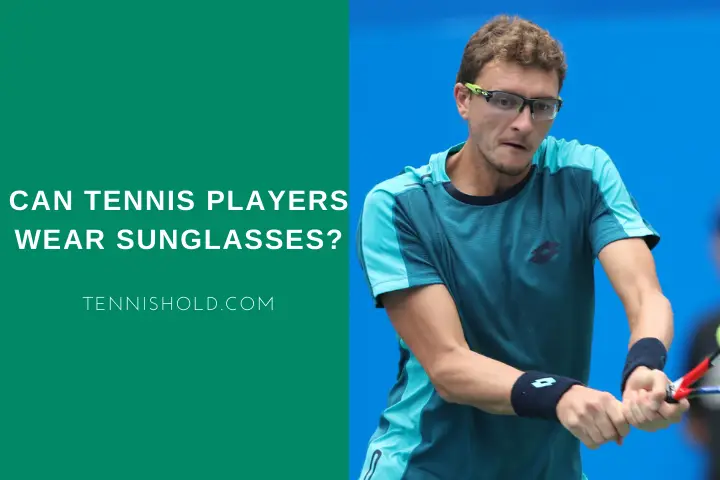When was the last time you saw a professional tennis player wearing sunglasses or even standard glasses?
I am an avid tennis fan and work professionally in the sport, and I can only think of two major players who regularly wear glasses when competing. Dennis Istomin and Janko Tipsarevic.
Most tennis players opt to use contact lenses instead of glasses. The best-known player requiring contact lenses is world number 1 Novak Djokovic.
But can tennis players wear sunglasses?
Of course, tennis players can wear sunglasses, but some challenges come with it. Wearing glasses will affect the player’s peripheral vision. The slightest inconvenience could make the difference between winning and losing a point.
Janko Tipsarevic has a career-high ranking of number 8. Denis Istomin has a career-high of 33. So it is clearly possible to reach the top levels of the game wearing sunglasses.
In this article I will be covering:
- The rules on wearing sunglasses in tennis
- Why most players don’t wear sunglasses
- Whether sunglasses affect depth perception on court
- Why tennis players choose caps over sunglasses
If you’d like to learn more about tennis players and sunglasses, read on!
Do Tennis Rules Allow Players To Wear Sunglasses?
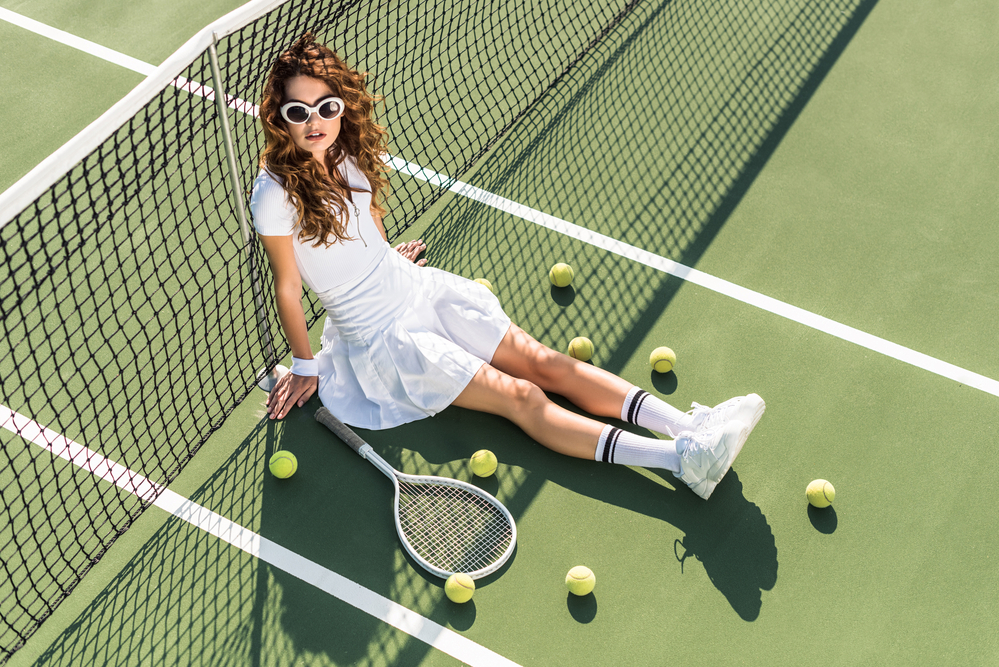
The ITF (International Tennis Federation) rules make no mention of glasses whatsoever. It can thus be assumed that neither Istomin nor Tipsarevic would have gotten away with wearing glasses if it was against the ITF rules.
The most likely reason that there are no regulations regarding sunglasses is that it offers no unfair benefit.
If you wear sunglasses, it is not going to increase your chances of victory. If anything, it will reduce them.
Regulating the use of sunglasses is as ridiculous as regulating what color t-shirt you could wear.
Except at Wimbledon, of course, where there is a long-standing tradition of all players wearing just white.
If the ITF began regulating the use of sunglasses, they would have to start specifying the rules on every piece of clothing.
Why Don’t Tennis Players Wear Sunglasses?
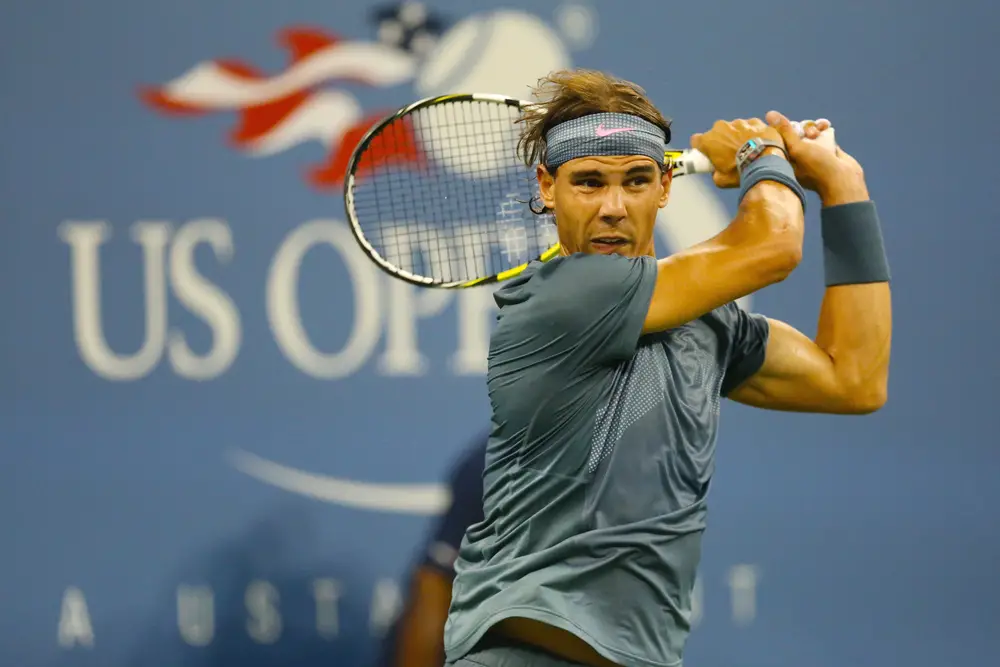
Sunglasses Can Move Around The Head
Sunglasses are not the most secure item of clothing. When I bob my head along to music in the car on a sunny day, I often know they will fall out of place.
Just imagine what will happen to them in a long, intense rally in which you move side-to-side and back-and-forth.
Most players you see using glasses or sunglasses will have a strap around the back of their heads to hold them in place.
Even though the strap will help hold them still, there is no guarantee that they won’t move around during play.
Sunglasses moving can cause a distraction and affect the player’s concentration. If you are trying to focus on the incoming ball and the glasses move out of place, it will not make playing any easier.
Even though I never wear sunglasses when playing a match, I will often have them on when coaching.
When I am coaching, my priority is comfort and being able to focus on the player I’m teaching.
If I am taking a lesson, it is not as serious if I miss a ball as nothing is at stake. However, I could lose the point in a match and potentially the game set or even match.
Blind Spots That Can Cause Sun To Flash In The Eye
I mentioned earlier how wearing sunglasses can affect peripheral vision.
Wearing sunglasses also creates blind spots where the frame is. If you are looking at the right angle, it can cause a flash in the eye as you turn into the sun.
The blind spot will block the sun, and it will come into vision as you tilt your head.
The tilt of the head into the ray of sunlight will cause the eyes to be dazzled. That half a second of dazzle could be the difference between winning and losing a point.
If that head position change occurs just as you hit the ball, it could be even more decisive.
Tennis players that do wear sunglasses will tend to pick more rectangular-shaped pairs. This is as the blind spot is even smaller with these types.
For most recreational and low-level competitive players, the difference it will make will be minor.
If you feel comfortable wearing sunglasses when playing, just wear them.
Sungalsses Can Block The View
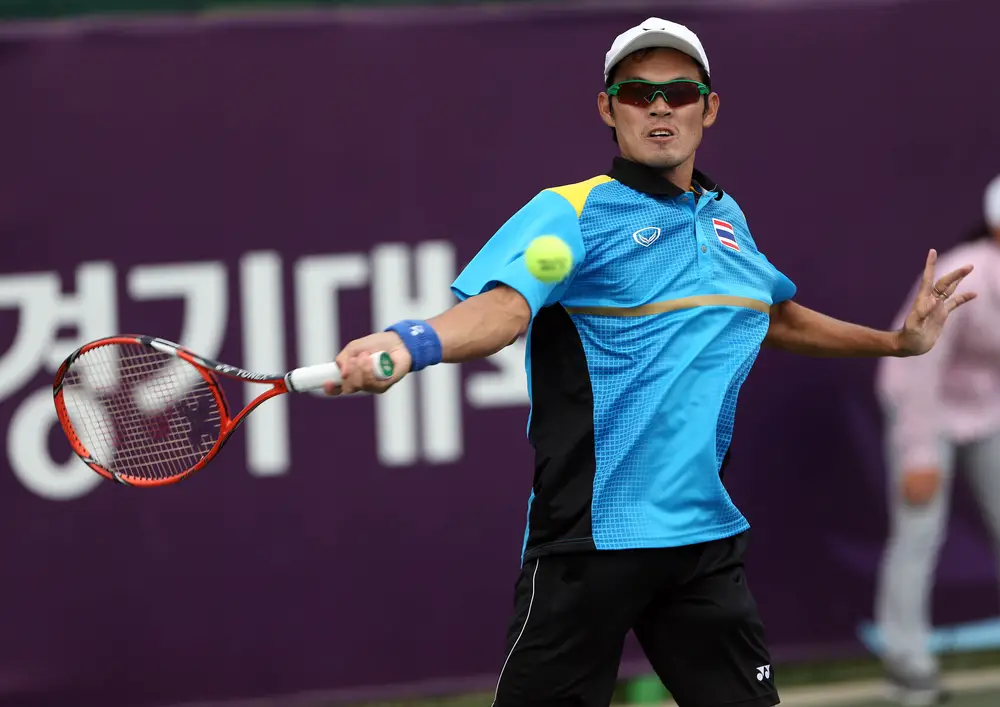
I was unable to find any definitive figures on how much vision is blocked by wearing sunglasses. This is most likely because it will vary from model to model.
What is clear is that whatever glasses you wear will affect your peripheral vision in some way. Unfortunately, I’ve never come across a pair of sunglasses with 100% transparent frames.
Frames are an integral part of sunglasses. Without the frames, the glass would not hold in place. It is, therefore, not possible to just remove the frame.
Even with Istomin’s rectangular glasses, there is still a large part of the frame blocking the upper section of his view.
There is; however, no frame blocking the bottom section of the glasses, so it might make dealing with short balls easier than high ones.
You might, at this point, be thinking it is such a tiny section of the player’s vision that it doesn’t make any difference.
In tennis it is very simple, you win the point if you put one more ball in the court than your opponent.
If the hindrance from the glasses blocking your view causes you to lose just one point, it is for many, one point too many.
That is in essence why tennis players generally do not wear sunglasses.
Weather Can Change Quickly During The Game
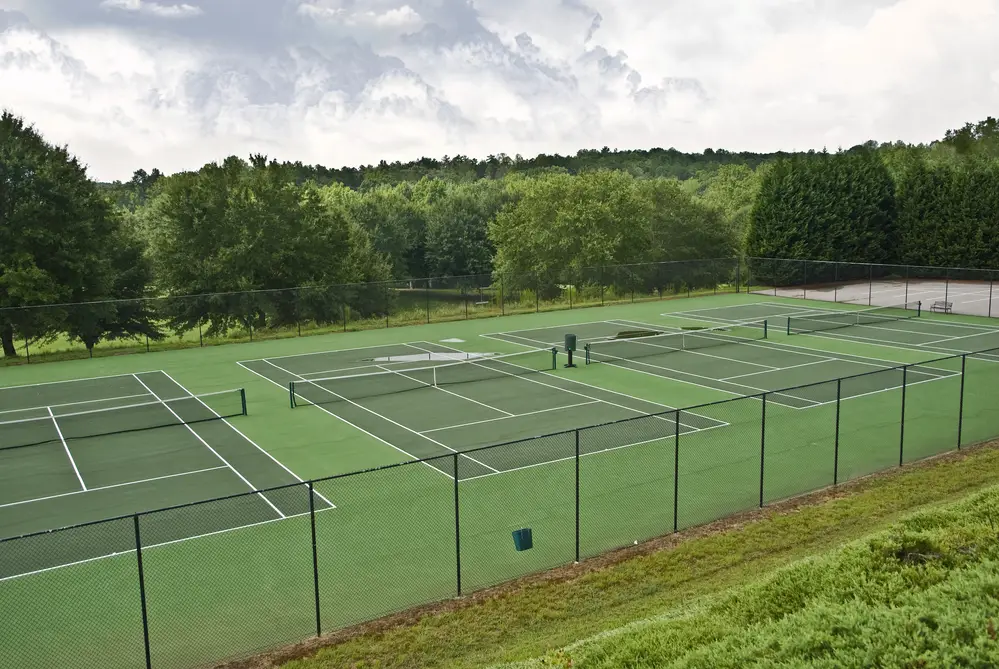
Have you ever watched Nadal as he changes ends in a match?
Whenever Nadal switches end, he makes sure that the labels on his water bottle point towards the baseline he is playing from.
This has no impact on his performance, but it is an example of how superstitious tennis players can be.
Tennis is a very repetitive sport, and players like to have continuity. Therefore, wearing sunglasses offers an unnecessary element of change.
Superstitious players may even perceive it as bad luck as it doesn’t fit in with their habits.
Players can’t play with sunglasses all the time. In addition, matches are often played indoors, and there is no reason to wear sunglasses inside.
If you’ve ever watched long evening matches at Wimbledon, you will have noticed that half of the court is in the sunlight while the other half is in the shade.
This proves challenging with players who wear sunglasses as they would be wearing them on one section of the court but not the other.
Imagine that a player is competing in the shade, and then suddenly the sun comes out. Even if they do wear sunglasses, they will still be dazzled by the change of light.
The sunglasses will just reduce the dazzle rather than eliminate it.
Of course, if you wear sunglasses when the sun is out and then it disappears, your eyes will see the court as even darker and take longer to adapt.
Do Sunglasses Affect Court Depth Perception?
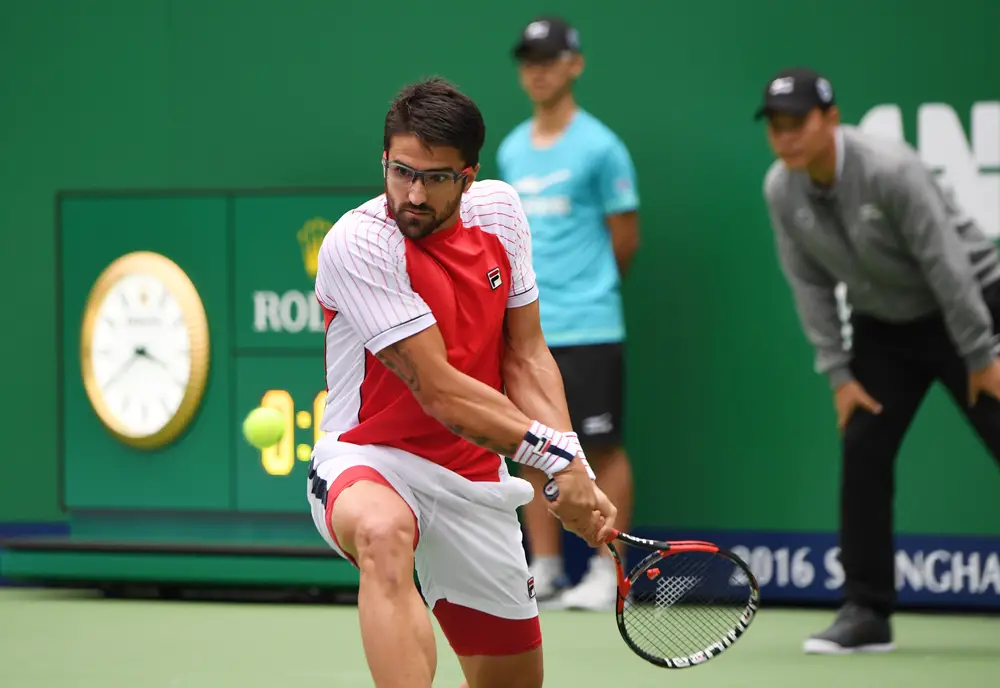
Sunglasses will, in most cases, have little to no effect on your depth perception. The exception is possibly polarized sunglasses.
Golfers regularly wear sunglasses.
There is a common belief that polarized sunglasses will have a greater effect on depth perception.
Many skiers are also advised not to wear polarized sunglasses, making it harder to spot ice patches.
This could also make it more challenging for tennis players to notice a wet patch on the court.
My personal experience is that neither polarized nor standard sunglasses have any effect on depth perception on the tennis court. There are some who will disagree with me though.
Also read: Can Tennis Players Wear Jewelry?
Do Tennis Players Prefer Caps?
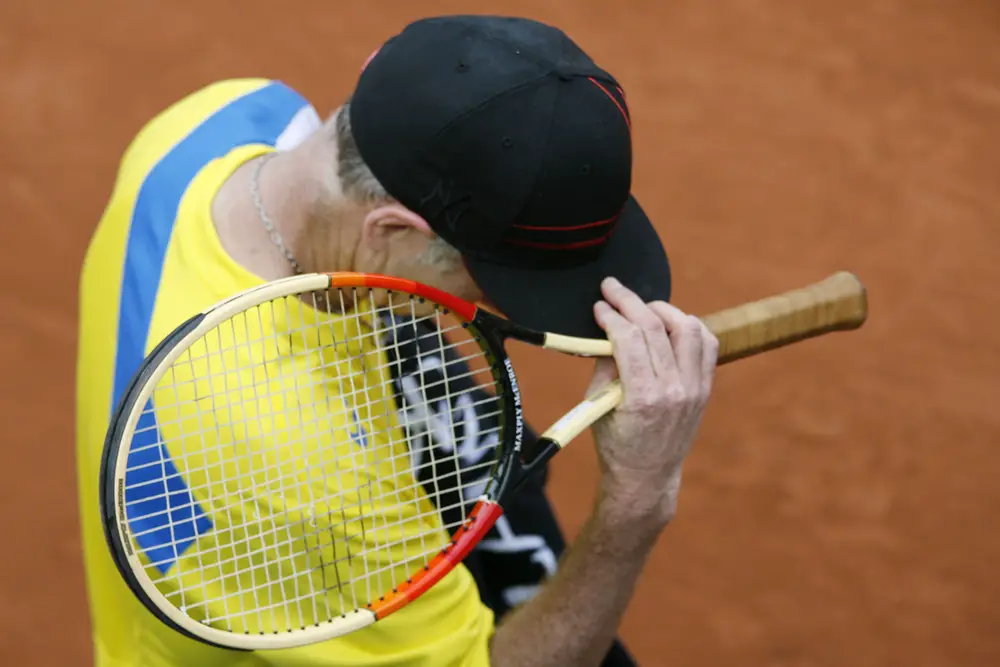
Seeing a professional tennis player with sunglasses is a rare sight. Caps, however, are very common.
The highest-ranked cap-wearing player today is world number 1, Novak Djokovic. Of course, he doesn’t always wear his cap, but you will typically see it come out on sunny days.
Some players choose to have the cap on, not just for protection from the sun. For example, Czech Tomas Berdych was known to have his cap on the whole time, rain or shine, indoors or outdoors.
The big difference with caps is that they do not adversely affect the tennis player’s vision. The only area affected would be the section above the head.
How often do tennis players need to look up when not serving or smashing?
Don’t forget to read: Do Tennis Players Wear Gloves?
Final Words
There are far more reasons to not wear sunglasses than to wear them. But if you feel comfortable with them, then continue.
Denis Istomin and Janko Tipsarevic did just fine, so why should it be any different for you?
What are your opinions on sunglasses? Do you wear them when you play? Perhaps you wear them in other sports?

